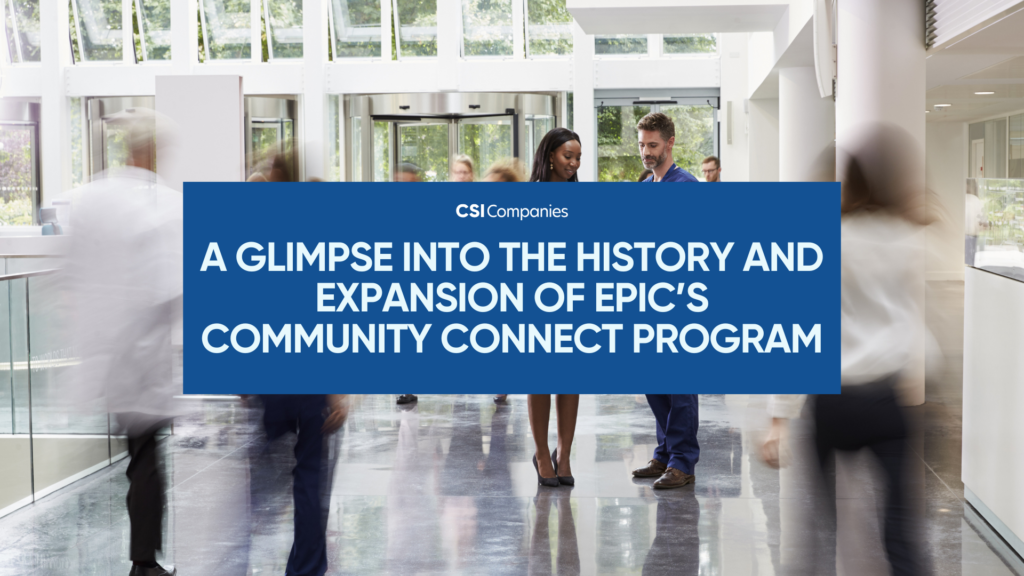
The evolution of Epic’s Community Connect Program has impacted hundreds of organizations and continues to deliver tremendous benefits to both host and hosted facilities, as well as their patients. Seventeen years ago, long before ‘interoperability’ became a buzzword, there was a desire to simplify patient coordination with referring organizations and a need to improve the communication of patient records and results. At the time, Epic limited its EHR software to larger hospital systems and was unable to directly support the implementation for smaller facilities. Thus, the introduction of Community Connect, a shared licensing agreement program that allows Epic customers to extend their Epic instance to neighboring partners and serve as an Epic host for the community.
I was first introduced to Epic’s Community Connect program fifteen years ago in Fort Myers, Florida. As a consultant, I had the opportunity to join a truly hands-on engagement, assisting the client’s potential new customers, who were primarily independent physician practices throughout the region. Our team conducted demonstrations at dozens of facilities and created a clear build/design process for rolling out the program to various types of primary care and specialty clinics. Since these facilities were all outpatient, the team consisted of Cadence, Prelude, and Ambulatory analysts. It wasn’t until a few years later that revenue cycle and inpatient modules were extended as part of the program.
As you can imagine, Epic has since developed numerous improvements and standardized approaches to Community Connect installs, including tools and processes that align with overall project governance, change control, and environment maintenance. Epic’s new accreditation process ensures quality and customer satisfaction for their partners. These advancements have positively impacted the overall install and ongoing customer maintenance, undoubtedly contributing to the continued growth of new Connect customers.
CSI has been fortunate to grow alongside these improvements, adopting Epic’s approach and methodologies to foster a true partnership between us, Epic’s primary client, and their new customer facilities. As CSI continues to be top-ranked in KLAS categories of Technical, Go-Live, and HIT Staffing, working with Epic, and our customers, has allowed us to provide extended expertise in Legacy services, Abstraction, TDR, Training, and Go-Live offerings. These services have enhanced CSI’s Community Connect Solution, adding value to both Epic and CSI’s shared customers. Let’s look at how variations in these areas can significantly improve the host’s Community Connect installation experience.
For Technical Services, all Community Connect organizations require transferring existing EHR records to Epic via manual or automated abstraction. While not all data or records need to be transferred into Epic, all data must be maintained in a system to ensure access upon request. CSI has a long history of delivering these services and has partnered with a data archival and storage firm to provide full compliance and legacy data support. The abstraction effort is often not coordinated by the Community Connect host, leaving the Connect customer responsible for identifying project requirements.
CSI Companies’ Abstraction Team
CSI’s abstraction team has supported a broad range of projects for dozens of organizations. The team has expertise in most EHRs, including Epic, Cerner, Allscripts, Centricity, MEDITECH, eClinicalWorks, and AthenaHealth. Regardless of the legacy system, CSI provides overall project management support by creating scripts with identified data elements for abstraction and providing a comprehensive task list to be coordinated with the Community Connect team. These efforts are essential to a successful system conversion and are a part of the CSI Community Connect Solution offering. They are also frequently provided as part of a staff augmentation need for full implementations and Community Connect projects.
Technical Dress Rehearsal
A successful Technical Dress Rehearsal (TDR) requires the expertise of a partner specializing in Community Connect and full Epic implementations. This is where CSI excels, offering a tailored and focused approach to TDR that ensures the rehearsal aligns perfectly with the unique needs and complexities of the customer. Our experts provide a full suite of TDR activities, including device placement evaluation, test script development, device testing, Command Center planning, and inventory management. All the resources used for TDR transition to Go-Live support, reducing costs for the client. Additionally, our team is trained in Epic interdependencies with third-party systems, including Nuance and M*Modal, providing added value to the client.
CSI continues to be recognized as the leading Go-Live consulting firm for large, 500+ at-the-elbow (ATE) support services. However, the success of the program extends beyond these large efforts – our true success and long-term partnerships with customers actually stem from smaller, ongoing go-live projects, such as Community Connect installs. Our unique approach, which includes early Training and Activation planning, has consistently led to highly successful projects. From coordination efforts with the Connect-hosted facility, CSI provides curriculum materials tailored for unique workflows, a credentialing program, ATE support, and Command Center support.
Organizations must consider various models for staffing a Community Connect project. CSI has worked with partners who want to lead the effort but require additional analysts due to competing initiatives. We have also taken the lead to allow our customers’ analysts to continue focusing on other efforts and priorities. For direct staffing, our Epic Practice has over 15 years experience providing application support expertise. CSI’s Community Connect Solution offers a full team, from Project Managers to certified analysts, who have supported multiple installs across facilities of all sizes and types. Our leadership team coordinates efforts to ensure Epic collaboration and adheres to both Epic’s methodologies and utilization of their required toolsets. Whether the Connect project is within an ambulatory or in-patient setting, we work with our customers to lead or augment their projects with an extensive team of Community Connect expertise.
The interesting history and growth of Community Connect would be incomplete without mentioning those who have extended their license as a business, beyond shared patients or regional market concepts. In 2013, a health system in Maryland extended their license to facilities in Bangor, ME and Nashua, NH. Having supported this multi-facility Community Connect effort, we realized this program would no longer be limited to local Ambulatory facilities, it would be for anyone. Fast forward to 2025, and several organizations now offer their Epic instance to facilities across the country, with direction and support from Epic. This approach provides even the most rural facilities with options for shared Epic instances, thereby delivering true benefits to patients.
Watching and learning along the way, Epic’s Community Connect program has proven to be a true asset to many organizations, allowing the CSI team to witness numerous post-live success stories. CSI recently attended a session in Verona, WI where we learned about the significant growth of the Community Connect program, including a substantial increase in adoption within the last few years. Given its long history, the industry has always consisted of organizations and facilities seeking to simplify patient coordination. As such, we are excited to see this alternative implementation model continue to have a profound impact on patients and their families across the country.
For more information, speak with one of our experts now!
About the Author

Douglas Herr is the Senior Vice President of Client Services and Strategy at CSI. Doug draws on 25 years of experience in Healthcare IT with expertise in governance planning, operational staffing models, training program development, and EHR implementations. Across both large healthcare systems and Ambulatory facilities, Doug has worked closely with clients to ensure their success with a variety of project efforts from enterprise-wide implementations, ongoing optimization initiatives, training design needs and Managed Services support models.